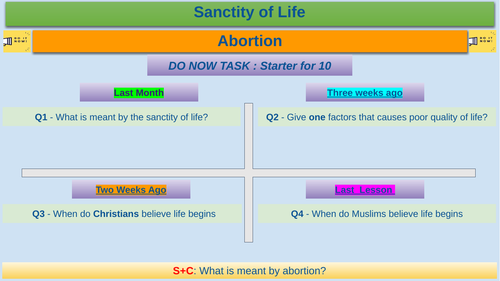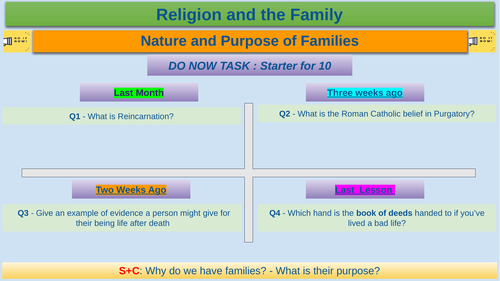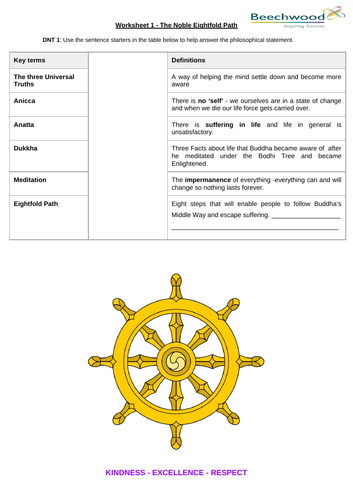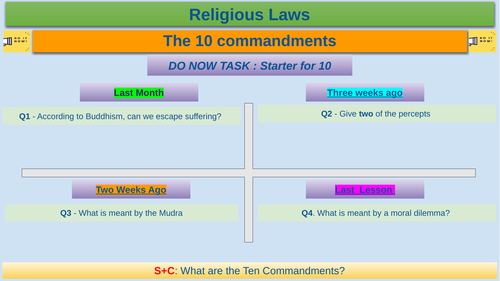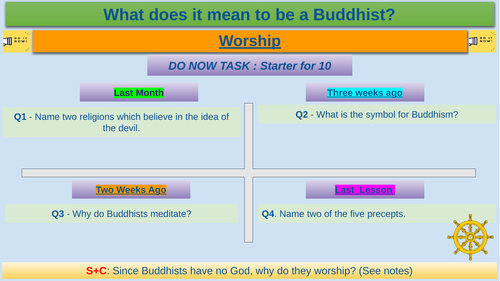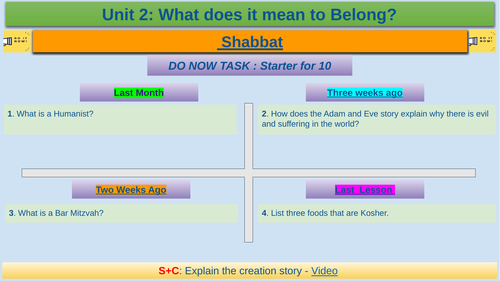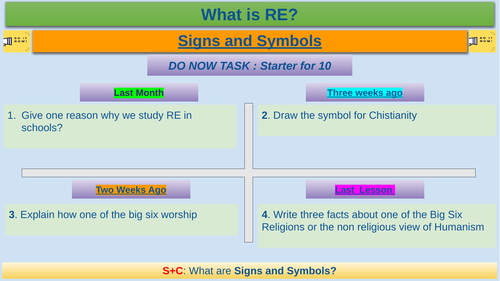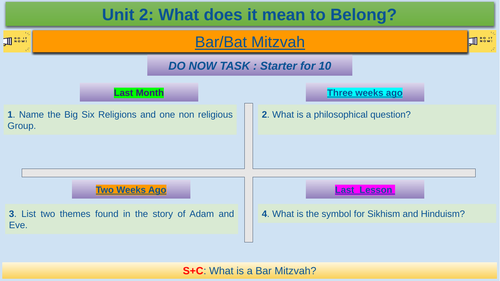
221Uploads
34k+Views
7k+Downloads
Religious education

Reasons for Crime - AQA - Religious Studies GCSE
Resource includes PowerPoint presention and differentiated worksheets for a 1 hour lesson, following the AQA specification.
Component 2: Thematic studies
Theme E
L1 - Good and Evil Intentions
L2 - Different types of crime
L3 - Reasons for Crime - Part 1
L4 - Reasons for Crime - Part 2
L5 - Aims of Punishment
L6 - Types of Punishment
L7 - Religious attitudes towards Types of Punishment
L8 - Religious attitudes to Fogiveness

Sacraments (Part 2) - AQA - Religious Studies GCSE
Resource includes PowerPoint presention and differentiated worksheets for a 1 hour lesson, following the AQA specification.
Component 1: The study of religions: beliefs, teachings and practices
Christian Practices
L1 - Forms of Worship - Part 1
L2 - Forms of Worship - Part 2
L3 - Prayer
L4 - The Sacraments - Part 1
L5 - The Sacraments - Part 2
L6 - Baptism + Eucharist
L7 - Pilgrimage
L8 - Celebrating Festivals
L9 - Role of Church
L11 - Church Growth
L12 - Poverty and Charities
L13 - New Testament Responses to Persecutions and Reconciliation
L14 - Assessment

Christian ideas of the afterlife - AQA - Religious Studies GCSE
Resource includes PowerPoint presention and differentiated worksheets for a 1 hour lesson, following the AQA specification.
Component 1: The study of religions: beliefs, teachings and practices
Christianity Beliefs and teachings
L1 - Nature of God (Part 1)
L2 - Evil and Suffering - Part 1
L3 - Evil and Suffering Part 2
L4 - The Trinity
L5 - Creation
L6 - The Incarnation
L7 - The Crucifixion
L8 - Resurrection and Asension
L9 - The Role of Christ in Salvation
L10 - Christian ideas of the afterlife
L11 - Assessment

The five roots of Usul as-Din in Shi'a Islam - AQA - Religious Studies GCSE
Resource includes PowerPoint presention and differentiated worksheets for a 1 hour lesson, following the AQA specification.
Component 1: The study of religions: beliefs, teachings and practices
Islam Beliefs and teachings
L1 - The Nature of Allah (Part 1)
L2 - The Nature of Allah (Part 2)
L3 - Risalah - Adam
L4 - Risalah (Ibrahim)
L5 - The life of the Prophet Muhammad
L6 - Diversity in Islam
L7 - The six articles of faith in Sunni Islam
L8 - The five roots of Usul as-Din in Shi’a Islam
L9 - The Qur’an
L10 - Other Holy Books
L11 - Angels
L12 - Life After Death
L13 - Assessment
L14 - DiRT

Divorce
KS3 Philosophy and Ethics - Unit 4 - Religion and the Family
Students will be able to:
To consider the different reasons for divorce in Britain today
To explore religious beliefs and teachings about divorce and remarriage
To evaluate whether it should be easy to get a divorce
Feedback is welcome, please check out the rest of my lessons in the Science and Religion Scheme of Work!

Abortion
KS3 Philosophy and Ethics - Unit 5 - Sanctity of Life
Students will be able to:
To summarise religious and non-religious teachings on abortion
To reflect on the ethical implications of abortion
To formulate links between key terms (sanctity of life / quality of life) and abortion
Feedback is welcome, please check out the rest of my lessons in the Science and Religion Scheme of Work!

The Role of Christ in Salvation - AQA - Religious Studies GCSE
Resource includes PowerPoint presention and differentiated worksheets for a 1 hour lesson, following the AQA specification.
Component 1: The study of religions: beliefs, teachings and practices
Christianity Beliefs and teachings
L1 - Nature of God (Part 1)
L2 - Evil and Suffering - Part 1
L3 - Evil and Suffering Part 2
L4 - The Trinity
L5 - Creation
L6 - The Incarnation
L7 - The Crucifixion
L8 - Resurrection and Asension
L9 - The Role of Christ in Salvation
L10 - Christian ideas of the afterlife
L11 - Assessment

The Qur'an - AQA - Religious Studies GCSE
Resource includes PowerPoint presention and differentiated worksheets for a 1 hour lesson, following the AQA specification.
Component 1: The study of religions: beliefs, teachings and practices
Islam Beliefs and teachings
L1 - The Nature of Allah (Part 1)
L2 - The Nature of Allah (Part 2)
L3 - Risalah - Adam
L4 - Risalah (Ibrahim)
L5 - The life of the Prophet Muhammad
L6 - Diversity in Islam
L7 - The six articles of faith in Sunni Islam
L8 - The five roots of Usul as-Din in Shi’a Islam
L9 - The Qur’an
L10 - Other Holy Books
L11 - Angels
L12 - Life After Death
L13 - Assessment
L14 - DiRT

Risalah (Ibrahim) - AQA - Religious Studies GCSE
Resource includes PowerPoint presention and differentiated worksheets for a 1 hour lesson, following the AQA specification.
Component 1: The study of religions: beliefs, teachings and practices
Islam Beliefs and teachings
L1 - The Nature of Allah (Part 1)
L2 - The Nature of Allah (Part 2)
L3 - Risalah - Adam
L4 - Risalah (Ibrahim)
L5 - The life of the Prophet Muhammad
L6 - Diversity in Islam
L7 - The six articles of faith in Sunni Islam
L8 - The five roots of Usul as-Din in Shi’a Islam
L9 - The Qur’an
L10 - Other Holy Books
L11 - Angels
L12 - Life After Death
L13 - Assessment
L14 - DiRT

Abuse of the environment - Part 2 - AQA - Religious Studies GCSE
Resource includes PowerPoint presention and differentiated worksheets for a 1 hour lesson, following the AQA specification.
Component 2: Thematic studies
Theme B
L1 - The origins of the universe and life (Christianity)
L2 - The origins of human life (Christianity)
L3 - The Origins of the universe Religious - Islam
L4 - Abuse of the environment - Part 1
L5 - Abuse of the environment - Part 2
L6 - When Does Life Begin
L7 - Abortion - Controversy
L8 - Abortion Religious Viewpoint
L9 - Euthanasia Controversy
L10 - Euthanasia Religious Views
L11 - The Afterlife
L12 - The Afterlife Religious Attitudes
L13- Assessment

Pacifism and Peacekeeping- AQA - Religious Studies GCSE
Resource includes PowerPoint presention and differentiated worksheets for a 1 hour lesson, following the AQA specification.
Component 2: Thematic studies
Theme D
L1 - Forgiveness and Reconciliation
L2 - Pacifism and Peacekeeping
L3 - Violent Protests
L4 - Terrorism
L5- Consequences and Victims of War
L6 - Weapons of Mass Destruction and Nuclear Weapons
L7 - Holy War and Just War
L8 - Assessment
L9 - DiRT

Marriage
KS3 Philosophy and Ethics - Unit 4 - Religion and the Family
Students will be able to:
To consider why people choose to get married
To explain different viewpoints on marriage
To evaluate whether marriage is still relevant today
Feedback is welcome, please check out the rest of my lessons in the Science and Religion Scheme of Work!

Nature and Purpose of Families
KS3 Philosophy and Ethics - Unit 4 - Religion and the Family
Students will be able to:
To consider the nature of families in the 21st century.
To explore religious beliefs and teachings about the nature of families and the role of parents
To evaluate the nature and purpose of families in the 21st century.
Feedback is welcome, please check out the rest of my lessons in the Science and Religion Scheme of Work!

The Noble Eightfold Path
KS3 Philosophy and Ethics - Unit 1- Evil and Suffering
Students will be able to:
To identify the principles of the Noble Eightfold Path
To examine the relationship between The Noble Eightfold Path and the Threefold Way
To suggest how each of the ethical principles can end suffering and ultimately help someone achieve nirvana
Feedback is welcome, please check out the rest of my lessons in the Science and Religion Scheme of Work!

The 10 commandments
KS3 Philosophy and Ethics - Unit 2 - Religious Laws
Students will be able to:
To identify the ten commandments
To explain how the ten commandments influence people today
To evaluate whether the Ten Commandments are still relevant today
Feedback is welcome, please check out the rest of my lessons in the Science and Religion Scheme of Work!

Buddhists Worship
KS3 Philosophy and Ethics - Unit 1- Evil and Suffering
Students will be able to:
To describe different ways Buddhists worship.
To explain how and why Buddhists worship includingthe symbolism of mudras and statues of Buddha.
To evaluate why Buddhists worship when they don’t believe in God.
Feedback is welcome, please check out the rest of my lessons in the Science and Religion Scheme of Work!

Consequences and Victims of War - AQA - Religious Studies GCSE
Resource includes PowerPoint presention and differentiated worksheets for a 1 hour lesson, following the AQA specification.
Component 2: Thematic studies
Theme D
L1 - Forgiveness and Reconciliation
L2 - Pacifism and Peacekeeping
L3 - Violent Protests
L4 - Terrorism
L5- Consequences and Victims of War
L6 - Weapons of Mass Destruction and Nuclear Weapons
L7 - Holy War and Just War
L8 - Assessment
L9 - DiRT

Shabbat
KS3 Philosophy and Ethics - Lesson 1 of Unit 1 - What is RE? SoW.
Students will be able to:
To identify what is meant by Shabbat
To explain why and how Jews celebrate Shabbat
To evaluate whether Shabbat is still important for Jews in Britain today
Feedback is welcome, please check out the rest of my lessons in the Science and Religion Scheme of Work!

Signs and Symbols
KS3 Philosophy and Ethics - Unit 1 - What is RE? SoW.
Students will be able to:
To identify what is meant by a sign and symbol
To explain the difference between a sign and a symbol
To examine the meaning of at least one religious and secular symbol
Feedback is welcome, please check out the rest of my lessons in the Science and Religion Scheme of Work!

Bar_Bat Mitzvah
KS3 Philosophy and Ethics - Unit 2: What does it mean to Belong?
Students will be able to:
To identify when a child becomes an adult in the Jewish community
To examine the key features of a Bar/Bat Mitzvah
To analyse the impact of a Bar/Bat Mitzvah on the Jewish community
Feedback is welcome, please check out the rest of my lessons in the Science and Religion Scheme of Work!






